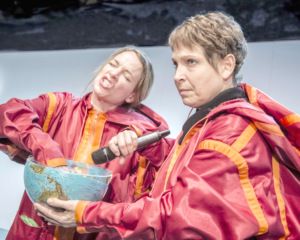News
CPH Stage: a festival for the masses or just for the locals?
This article is more than 9 years old.
Copenhagen-based theatre directors question timing and fairness of the set-up

“And the winner of the raffle is … every single Danish production involved in CPH Stage”
Should theatre be accessible to all? Well, Shakespeare clearly thought so. Back in the Bard’s day London’s Globe was known as the ‘theatre of a nation’ and its audience was a melting pot of heterogeneity, made up of the city’s rich right down to the penniless groundlings.
READ MORE: Calling all Copenhagen’s culture vultures: All the city’s a stage!
Democratic drama is something that the Copenhagen-based theatre festival CPH Stage – taking over the city’s stages for 12 days from June 1 – hopes to promote itself on.
A big buffet
“Everyone can find something in the program: your average Joe Bloggs who has never been to the theatre, as well the more regular, experienced theatre-goer. It’s a big buffet of performing arts,” says Morten Krogh, the festival manager.
Certainly the festival, now in its fourth year, has been gallant in its efforts to include non-Danish speaking performances in the program roster, with the 2016 festival boasting 56 non-Danish acts, which six are subtitled through the special text app THEA.
“We are really focused on making theatre accessible, as well as being very centred on the international aspect of the festival and the expat community,” contended Morten.
Funding an issue
But with a notable lack of English-language productions this year – just 24 out of a total of 110 – the assertion that CPH Stage is an ‘open theatre festival’ providing ‘theatre for all’ is brought into question.
Ian Burns, an English-language professional actor and director based in Copenhagen, explained why his company, That Theatre – which last participated in 2014 with the comedy ‘No!’ at Teatermuseet in Hofteatret – will be opting out of CPH Stage this June.
“It’s not a level playing field because we had to charge for our tickets to make ends meet. Many of the Danish companies’ productions were free. They don’t have to charge because they are funded,” he explained.
Stuart Lynch, the artistic director of the Lynch Theatre Company, who has worked as an international consultant for CPH Stage, agreed it was a problem.
“The majority of Danish productions are all funded,” he said.
“For an individual like Ian – who is a shining example of someone that can make a top-notch quality production but still make it run around – it’s difficult for him to make something for CPH Stage as a kind of freebie, when he is being undercut by all the other theatres because they have so much funding.”
Timing is everything
Another point of contention is the timing of the festival in June, which is traditionally the end of the theatre season here in Denmark.
“I think the timing is really good in terms of the Danish calendar, as the energy within the theatre sphere is really high at the end of June and everyone wants a final kick,” said Lynch.
The typical holiday season in Denmark spans from late June until early August; however, the majority of English-speaking tourists tend to visit the city during this time – particularly in August.
“The festival is designed to fit the Danish theatre season which is fair enough, but it’s the wrong time of the year for English-speaking tourists,” said Burns.
“From a tourist’s point of view, June is not a good time because generally other European countries go on holiday later in July and August. So there could be something later on,” admitted Lynch.
International scene growing
The English-language theatre scene in Copenhagen has been bubbling away for the last few years. In 2015, CPHCulture, the cinema and theatre review site, added a new category to its nominations: Årets udenlandske stykker – for the year’s best foreign theatre performances.
And just this year, another English-language theatre company, Down The Rabbit Hole – co-founded by Jeremy Thomas-Poulsen, Jens Blegaa and Vanessa Poole, familiar names on the Copenhagen theatre scene – was added to the bill.
While a relatively new Facebook page dedicated to ‘Theatre in English in Denmark’ has garnished over 1,000 members already.
Lynch, who is also the headmaster of Københavns Film & Teaterskole, has high hopes for the growth of the festival’s international offering in the coming years.
“I do miss the presence of That Theatre Company and would like to see the new generation of internationals, led by the likes of Jeremy Thomas-Poulsen, partake,” says Stuart.
“The festival is amazing, politicians will have to get behind it and give it some decent funding in order to produce more shows – both Danish and foreign. I hope that the festival gets more support behind it, as then it can grow even bigger.”






































